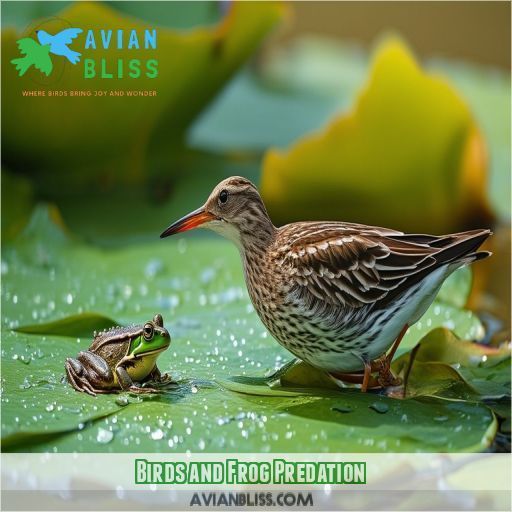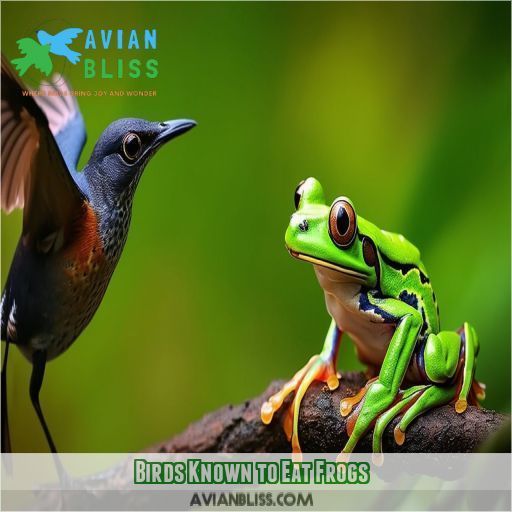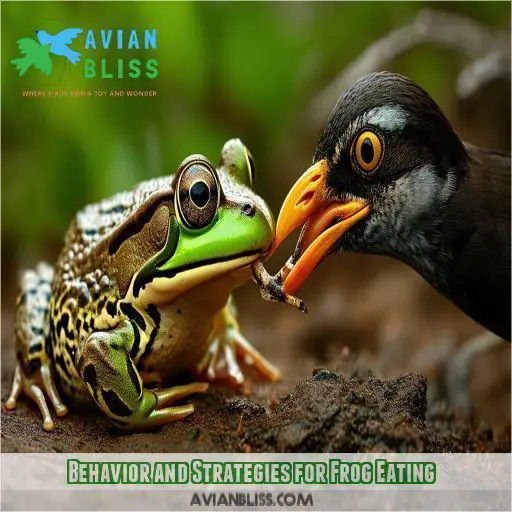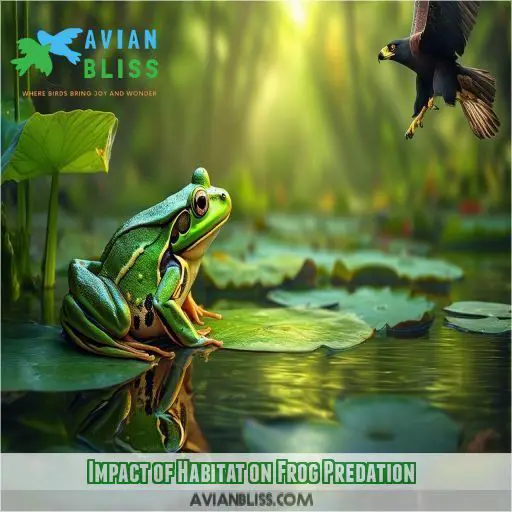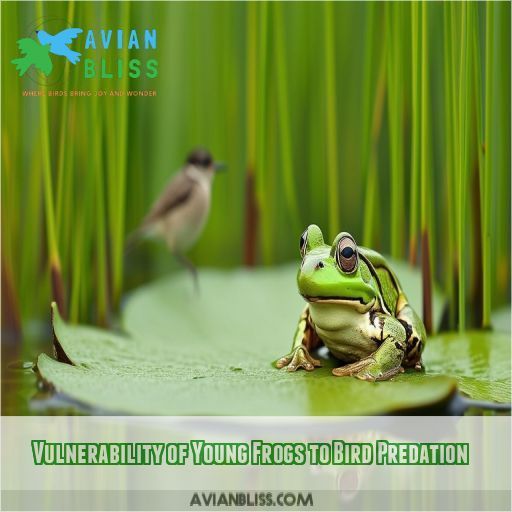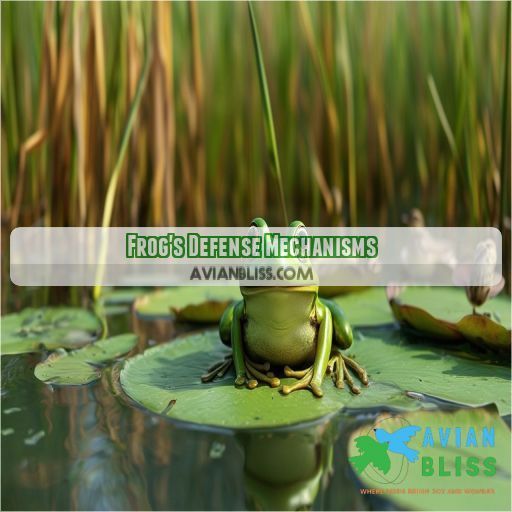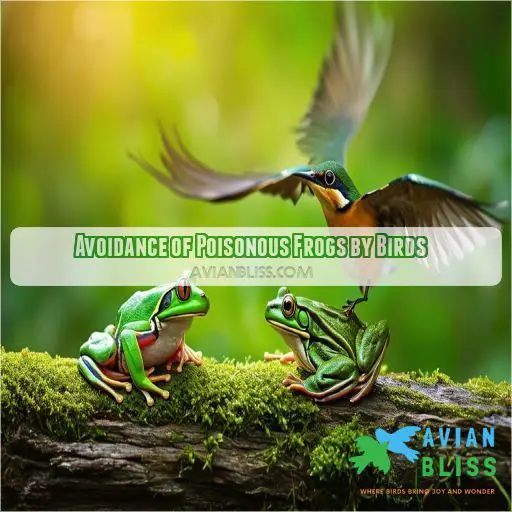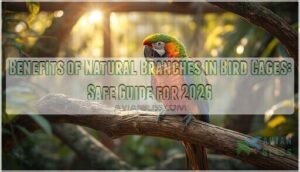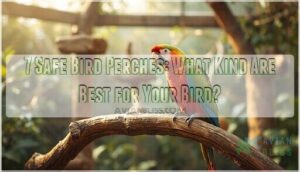This site is supported by our readers. We may earn a commission, at no cost to you, if you purchase through links.
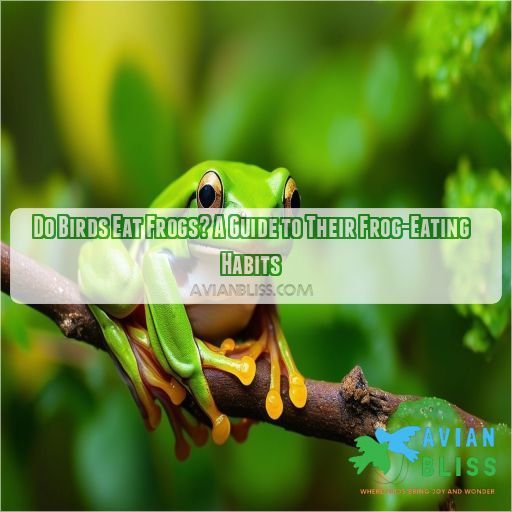
So, which birds have a taste for frog legs? The usual suspects are herons, egrets, storks, kingfishers, and owls. They’ve got their hunting strategies down, from patient staking outs to nighttime ambushes.
Stay tuned to discover more about these feathery frog predators and their unique dining habits.
Table Of Contents
- Key Takeaways
- Birds and Frog Predation
- Birds Known to Eat Frogs
- Behavior and Strategies for Frog Eating
- Impact of Habitat on Frog Predation
- Vulnerability of Young Frogs to Bird Predation
- Frog’s Defense Mechanisms
- Avoidance of Poisonous Frogs by Birds
- Frequently Asked Questions (FAQs)
- Do birds eat frogs?
- What birds eat frogs and tadpoles?
- Do bullfrogs eat birds?
- What animals eat frogs?
- What are the predators of the frog?
- Do blue jays eat frogs?
- Can crows eat frogs?
- What birds eat tree frogs?
- Do birds eat tadpoles?
- Are there birds that dont eat frogs?
- Why do birds avoid poisonous frogs?
- Where do birds hunt for frogs?
- Do birds eat toads?
- Conclusion
Key Takeaways
- Birds do indeed eat frogs, with great enthusiasm too. It’s like a fast-food snack for them – tasty and nutritious.
- The usual suspects include herons, egrets, storks, kingfishers, and owls. They’ve each mastered their own frog-hunting strategies, from daytime stalking to nighttime ambushes.
- Frogs may be an easy catch, but they’re not always the first choice. Birds of prey, like hawks and eagles, see them as just one item on their diverse menu.
- While birds will chow down on adult frogs, they also go after tadpoles and froglets. It’s a dangerous world for our hoppy friends!
Birds and Frog Predation
Birds and frogs have a complex ecological relationship. Birds are known to prey on frogs, and this behavior is an intriguing aspect of their diet.
Frogs are an easy catch and a good source of protein for birds, making them a tempting target. However, not all birds are frog enthusiasts. The decision to dine on frogs depends on a bird’s habitat, the availability of other food sources, and the time of year.
Some birds, like herons and egrets, are known to wade into shallow waters or marshy lands in search of a froggy feast. Owls, on the other hand, prefer to hunt frogs under the cover of darkness, using their exceptional night vision to their advantage.
While frogs may be on the menu for some birds, they’re not always the first choice. Birds of prey, such as hawks and eagles, consider frogs a part of their diverse diet, but they don’t discriminate—they’ll also snack on small mammals, reptiles, and other birds.
Birds Known to Eat Frogs
Let’s talk about birds and their frog-eating habits. You might be wondering, "Do birds really eat frogs?" The answer is a resounding yes! So, which feathered friends are guilty of this peculiar taste?
Well, quite a few, it turns out. The usual suspects include the elegant Great Blue Heron, along with its cousins, the herons, egrets, and storks. These long-legged birds are often spotted stalking frogs in shallow waters or marshy lands. But they’re not alone in their froggy feasts.
Kingfishers also join the party, swooping in to snatch frogs from the water’s edge. And let’s not forget the birds of prey—hawks and eagles—who may not specifically target frogs, but they sure won’t say no to a juicy amphibian treat.
When the sun sets, the nocturnal hunters take over. The Barred Owl and Great Horned Owl spread their wings and silently glide in search of prey, often ending up with a frog or two on their menu.
These birds don’t discriminate; they’ll gobble up adult frogs, chase down tadpoles, and even pick apart froglets. It’s a ruthless world out there for our hoppy friends. But why do birds go for frogs? Well, that’s a tale for another time. Stay tuned, folks!
Behavior and Strategies for Frog Eating
Birds have various strategies for hunting and eating frogs. Some birds, like herons and egrets, patiently wait in shallow waters or marshy lands for their prey. They may use aggressive attacks or chasing tactics to capture frogs. Owls, on the other hand, prefer to hunt frogs under the cover of darkness, taking advantage of the night to surprise their prey.
Once a bird has caught a frog, it will often pick it apart, leaving little to no remains. This behaviour has been observed over a period of several days, with multiple incidents of birds aggressively pursuing and consuming frogs. It’s worth noting that this behaviour isn’t typical for all bird species, and there may be opportunistic or environmental factors at play.
Impact of Habitat on Frog Predation
A bird’s diet is heavily influenced by its habitat. Here’s how:
Birds living near freshwater environments, such as lakes, ponds, or rivers, are more likely to indulge in a froggy feast. These aquatic habitats provide an abundant supply of frogs, making them an easily accessible meal for hungry birds.
The size of the frog a bird can consume is directly related to the size of the bird itself. Larger birds can handle bigger frogs, while smaller birds may stick to tadpoles or young frogs.
Birds that frequent aquatic environments have the advantage of surprise on their side. They can stealthily wade into shallow waters or marshy lands to snatch unsuspecting frogs. This ambush technique is a favorite hunting strategy for birds looking to add some frog legs to their menu.
Vulnerability of Young Frogs to Bird Predation
Baby frogs, or froglets, tadpoles, and even slightly older juvenile frogs are especially vulnerable to becoming a bird’s next meal. Their smaller size and less evasive nature make them easy pickings for hungry birds.
| Bird Species | Prey Preference | Hunting Style |
|---|---|---|
| Herons | Froglets | Aggressive attacks |
| Storks | Tadpoles | Chasing |
| Egrets | Juvenile Frogs | Picking to pieces |
These young frogs haven’t yet developed the survival skills to evade predators effectively, making them sitting ducks (or should we say, sitting frogs?) for opportunistic birds.
Frog’s Defense Mechanisms
Now, let’s talk about the other side of the story: how frogs avoid becoming a bird’s next meal. Frogs have developed some clever defense mechanisms to outsmart their feathered foes. Here are some of their sneaky strategies:
- Jumping Tactics: Frogs are famous for their powerful legs, which they use to leap out of harm’s way. Some species can jump over 40 times their body length, leaving birds hopping mad!
- Camouflage Skills: With their ability to blend into their surroundings, frogs can pull a disappearing act that would impress any magician.
- Chemical Warfare: Some frogs secrete bad-tasting chemicals, making themselves unappetizing to potential predators. Talk about a nasty surprise!
- Tree Climbing: When the going gets tough, frogs head for the trees. They use their sticky toe pads to climb and hide in places where birds can’t easily reach them.
Avoidance of Poisonous Frogs by Birds
While birds love a good frog feast, they’re not so keen on poisonous frogs. Here’s why:
The first thing you’ll notice about poisonous frogs is their vibrant colors. These bright hues are nature’s way of saying, "Back off, I’m toxic!" Birds get the message and steer clear. It’s like a neon sign flashing "Danger!"
Poisonous frogs have their own language of toxicity signals. These signals are like a secret code that birds have learned to decipher. So, when a frog flashes its toxic warning signs, birds know to look the other way.
Birds in Central and South America are especially wise to this danger. They’ve evolved to recognize and avoid poisonous frogs, keeping themselves safe from harm. It’s a survival skill passed down through generations.
Even if a bird takes a chance on a tasty-looking treat, the frog’s got one last trick up its sleeve. Many poisonous frogs secrete chemicals that taste awful, ensuring the bird thinks twice before taking another bite.
Frequently Asked Questions (FAQs)
Do birds eat frogs?
Yes, birds do eat frogs. It’s a fact—a tasty treat for some feathered friends. From herons to owls, many species enjoy a froggy feast. Why? Well, frogs are an easy catch and pack a protein punch.
What birds eat frogs and tadpoles?
Birds like herons, storks, egrets, kingfishers, and owls eat frogs and tadpoles. These birds hang out near freshwater, making it easier to spot and catch frogs.
Do bullfrogs eat birds?
Yes, bullfrogs do eat birds. They’re known to eat small birds, ducklings, and even bats. So, it’s a case of survival of the fittest between birds and bullfrogs.
What animals eat frogs?
It’s not just birds that eat frogs. Snakes, fish, and even other frogs join the feast. But, among our feathered friends, herons, egrets, storks, kingfishers, and owls are the usual suspects.
What are the predators of the frog?
Frogs have a variety of predators, including birds, snakes, fish, and even other frogs. Birds that eat frogs include herons, storks, egrets, kingfishers, hawks, eagles, and owls.
Do blue jays eat frogs?
Yes, blue jays do eat frogs. They’re known to eat snails, spiders, small rodents, and even other birds. They’re omnivores with a varied diet.
Can crows eat frogs?
Yep, crows can eat frogs. In fact, they’re known to feast on these hopping critters. It’s a bit like a tasty treat for them, and they’re not alone—birds of all sorts, from herons to owls, enjoy a froggy snack now and then.
What birds eat tree frogs?
A range of birds eat tree frogs, including hawks, swans, geese, ducks, crows, ravens, and owls. Toucans, hornbills, and eagles may also eat tree frogs.
Do birds eat tadpoles?
Yes, birds do eat tadpoles. Birds that forage in or near water, like ducks and waders, are known to feast on tadpoles and froglets, taking advantage of their less evasive nature.
Are there birds that dont eat frogs?
Birds that don’t eat frogs include those that aren’t exposed to them in their habitat, and those that recognise the bright colours of poisonous frogs as a warning.
Why do birds avoid poisonous frogs?
Birds steer clear of poisonous frogs because they’re toxic. These frogs sport bright colors, like a flashing neon sign warning birds: "Don’t eat me, I’m lethal!" This is nature’s way of keeping predators at bay.
Where do birds hunt for frogs?
Birds hunt frogs in shallow waters, marshes, swamps, bogs, and coastal areas. They also spot frogs from high vantage points, striking when the moment’s right.
Do birds eat toads?
Yes, birds do eat toads. Crows, jays, magpies, ravens, and geese are among the birds that eat toads. Owls also prey on toads, using their sharp talons and acute vision to hunt.
Conclusion
Now you know that the answer to "do birds eat frogs?" is a resounding yes.
From herons to owls, these feathered hunters have developed clever strategies to make frogs their next meal.
Whether it’s a tasty treat or a survival snack, birds have an appetite for amphibians.

